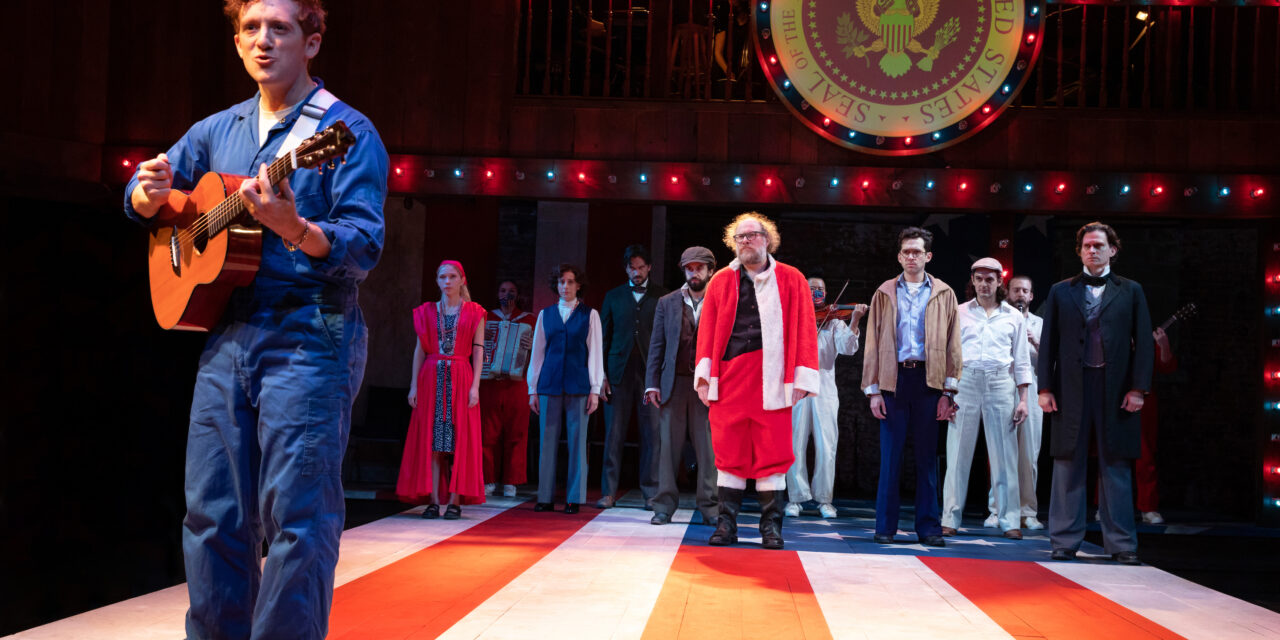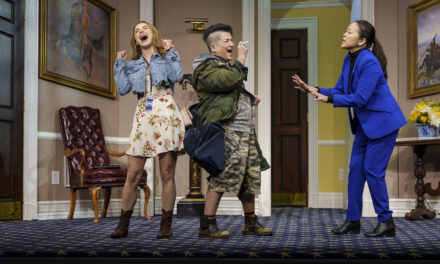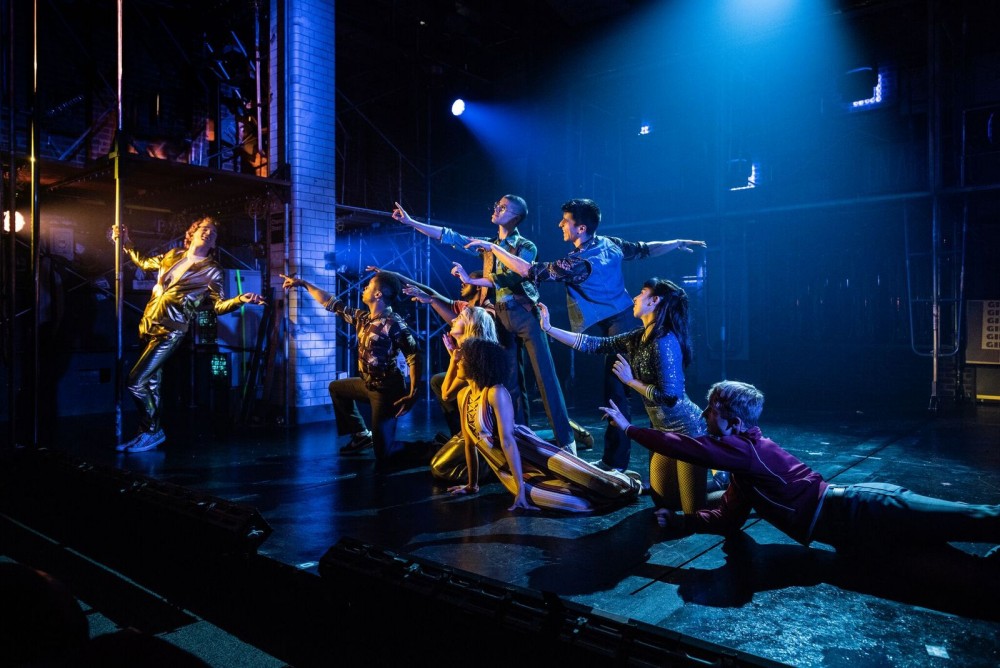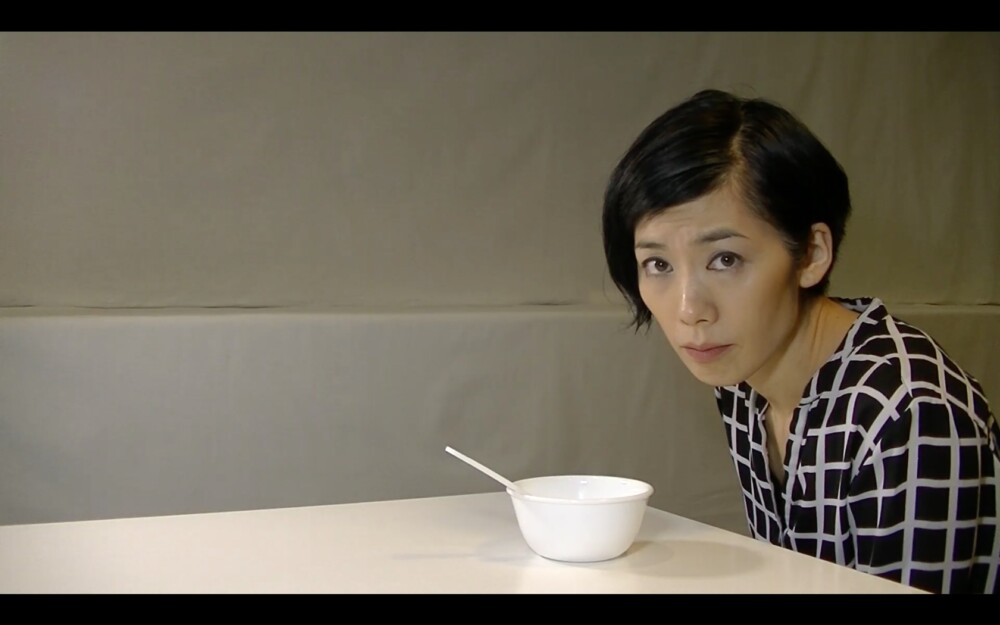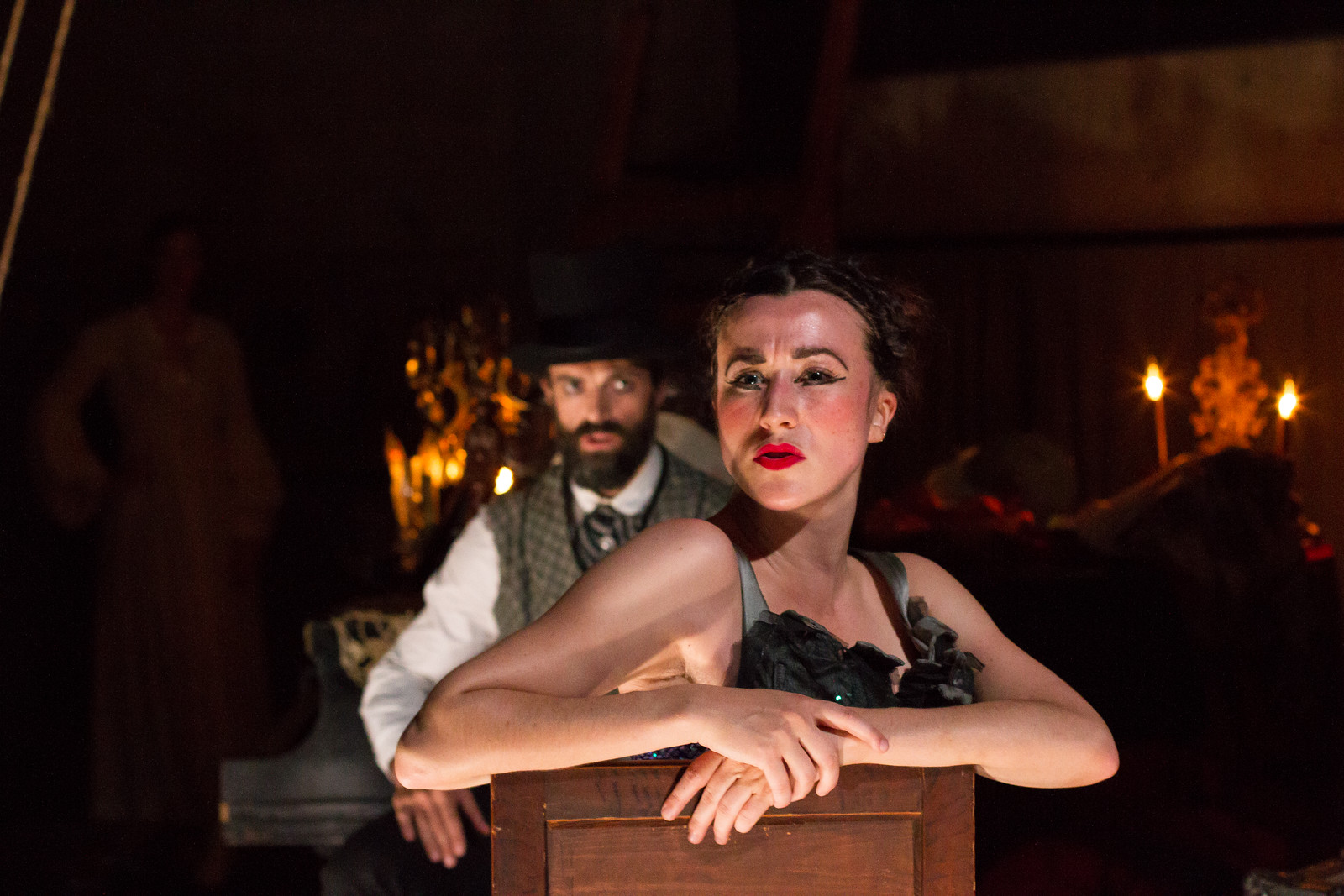By Marilyn Lester . . .
The founding of the United States of America is often referred to as “the American experiment.” In the 245 years since the nation’s birth, that bright, apple pie American Dream has also shown a dark side—the subject of Assassins. The Classic Stage Company production, which was halted before it began by the 2020 pandemic lockdown, is now up and running with a supremely talented cast of principals who transcend misguided direction by John Doyle.
Assassins, from an idea by Charles Gilbert Jr., with book by John Weidman and music and lyrics by Stephen Sondheim, explores problematic societal issues, symbolized in these high-profile figures of Presidential murder. As individuals, the assassins have each grappled with common issues and problems, only their solution was to kill a President. John Wilkes Booth and Leon Czolgosz acted to fight perceived injustice. Giusseppe Zangara, Sara Jane Moore and Samuel Byck acted out of disillusionment and disaffection, while Charles Guiteau was a thwarted idealist. Lynette “Squeaky” Fromme and John Hinkley sought to prove themselves worthy of their love objects.
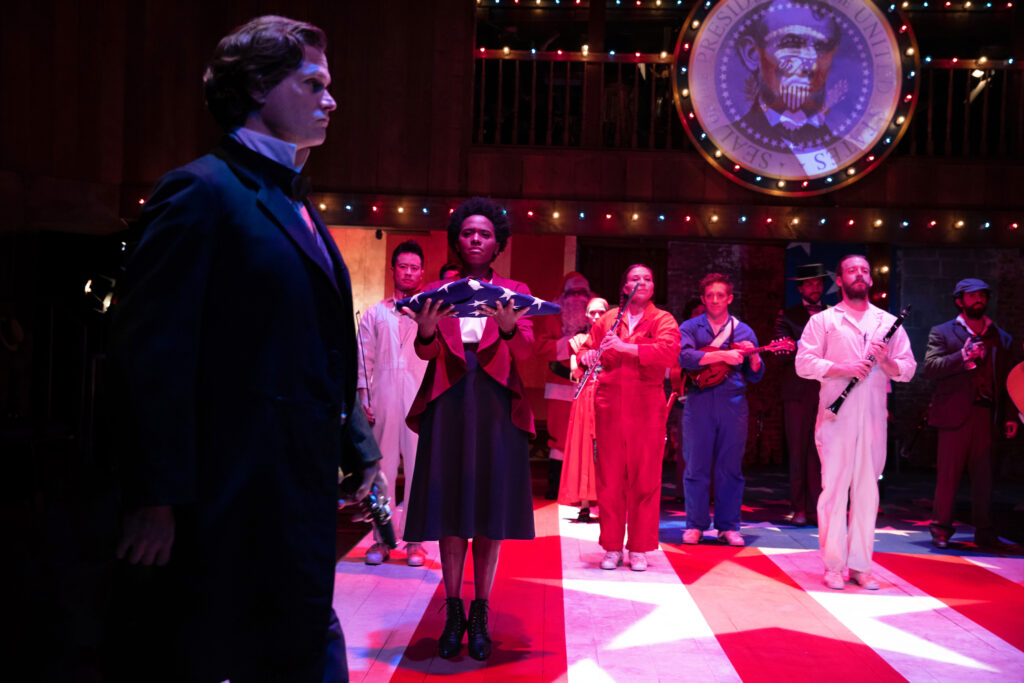
Taken together, the assassins form a community, a view essential to the Weidman/Sondheim vision of Assassins. Each assassin is from a different period in history, but are bound together into a “family” by their common act of violence. With the exception of Lee Harvey Oswald, who appears at the very end of the musical, they interact with each other throughout. The ensemble forms a second community made up of bystanders and “average Americans”— the witnesses to history.
To avoid glorifying the characters, Weidman and Sondheim understood that setting would be crucial. And so the framing device of action is a burlesque—a carnival with a shooting gallery framed by flashing lights. Here, egged on by The Proprietor (Eddie Cooper) the assassins collect their guns with a promise that their problems will be solved by killing a President (“Everybody’s Got the Right”). A powerful moment of social commentary comes with a quartet (Czolgosz, Booth, Guiteau, Moore) who sing about the power of the gun in “The Gun Song.” Near the end of Assassins, The Balladeer (Ethan Slater) reveals that their actions didn’t solve their problems or the country’s; only following the American Dream can do that. “Another National Anthem” follows as a song for all Americans dispossessed by the dream.
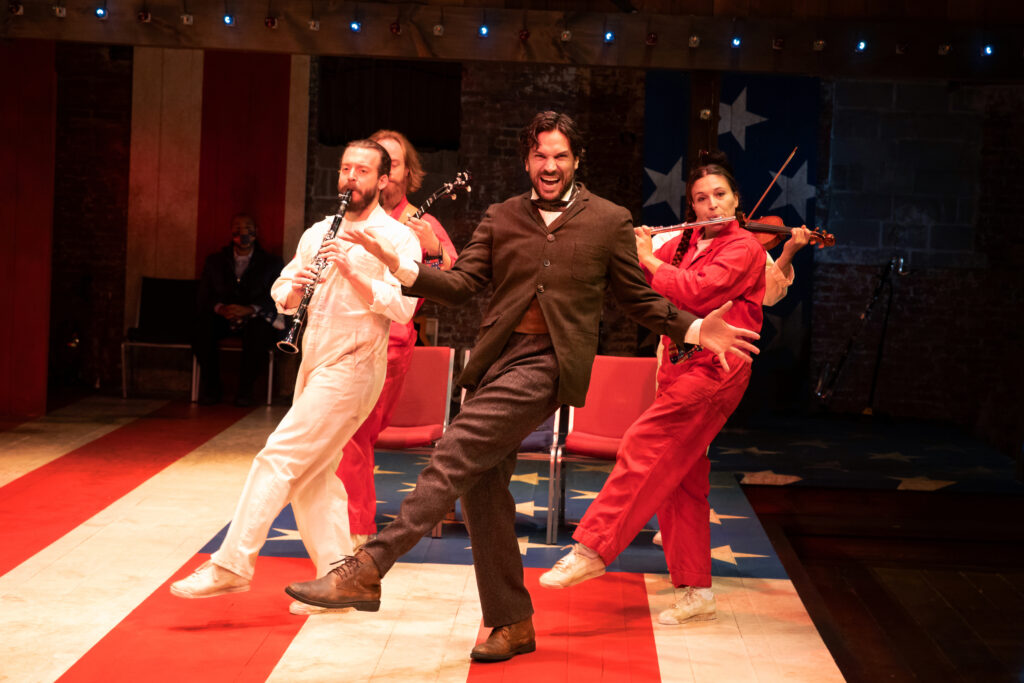
What Doyle has missed in mounting Assassins is the core of the Weidman/Sondheim vision. It is the critical sense of community that gives Assassins its power. The characters’ intense and robust interaction with each other within the shooting gallery heightens the sense of non-reality and the distortion of the American Dream. In the sparse and minimal set, there was no context, no midway to provide a sinister atmosphere. Moreover, the principals, all exceptional actors, were directed socially distant from each other, and masked, only removing their face coverings when they spoke. Not only was this an annoying distraction, but the power of Assassins was disenfranchised, with wasted moments and opportunities missed. Similarly, the force of the ensemble was diminished with members doubling as musicians, dressed in white and red jumpsuits. Rather than forming a strong community of witnesses to history, they became cyphers, distanced from the action of the musical.
The cast is to be highly commended for their superior skills in character interpretation. Steven Pasquale was an intense and thoroughly convincing John Wilkes Booth, while Andy Grotelueschen’s Samuel Byck was bone-chillingly real, especially as he describes a prescient plan to pilot a 747 airplane into the Nixon White House. Will Swenson as a sweetly deranged, if lethal Charles Guiteau, whose one desire was to become Ambassador to France, captured the character in his perfect rendition of “I Am Going to the Lordy” and during “The Ballad of Guiteau.” A highlight of Assassins was Judy Kuhn as Sara Jane Moore. Her portrayal of this quirkily deranged woman was both funny and poignant. Moore is a mess—and even though she’s intent on killing Gerald Ford (she misses) Kuhn’s depiction of her invited a certain amount of sympathy. Also commendable were Brandon Uranowitz as Leon Czolgosz, Wesley Taylor as Giuseppe Zangara, Tavi Gevinson as Lynette “Squeaky” Fromme, Adam Chanler-Berat as John Hinckley, Jr. and Bianca Horn as Emma Goldman.
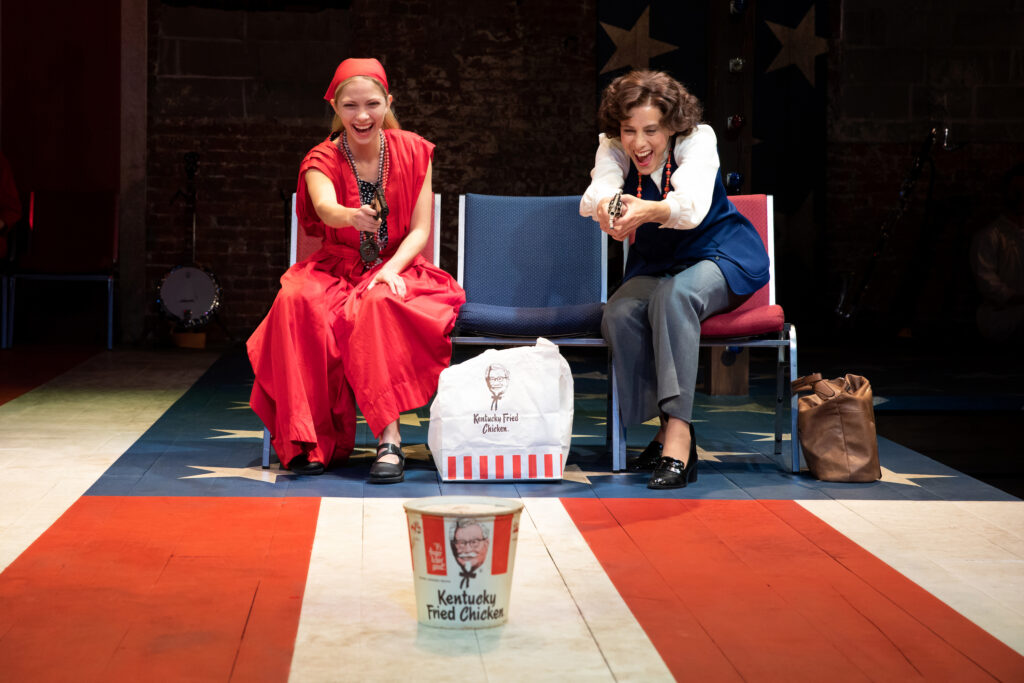
The climax of Assassins comes with the murder of John F. Kennedy by Oswald. In “November 22, 1963” the ensemble as a community remembers where each was at that moment and laments in “Something Just Broke” that the nation has now been changed forever. It’s followed by the reprise of “Everybody’s Got The Right” and the musical ends.
There have been several versions of Assassins since the original 1990 Playwrights Horizons mounting. The accepted one now is the 2004 Tony-winning Broadway revival, which doesn’t include the cut 1990 “The Flag Song.” Placed at the beginning of the musical, it was discarded as irrelevant. The number was performed by Raul Esparza with a full orchestra at the 2016 Dramatists Guild Foundation annual gala and has become a part of Brian Stokes Mitchell’s repertoire. “The Flag Song” is redemptive. It speaks to societal disillusionment and concludes that the solution is in our nation’s motto, e pluribus unum—one from many. In this organization of human beings, the lyric says, is the power to change things for the better—a truth we must remember as the flag goes by.
“The Flag Song” was added as a coda in the remarkable 2019 production of Assassins at Arlington, Virginia’s Signature Theater. It was the perfect ending of hope for an audience enduring the divisions of an America in which many things have broken.
Assassins plays at the Classic Stage Company, Lynn F. Angelson Theater, 136 E 13th St, New York, NY 10003, 212-677-4210, running through January 29, 2022 -Run Time: 1 hr 45 min. no intermission
photos: Julieta Cervantes


